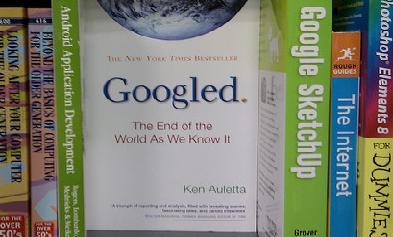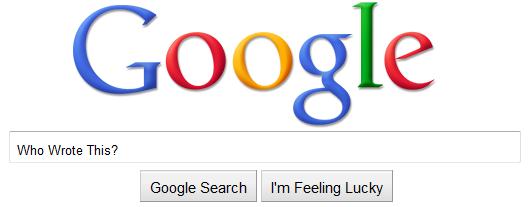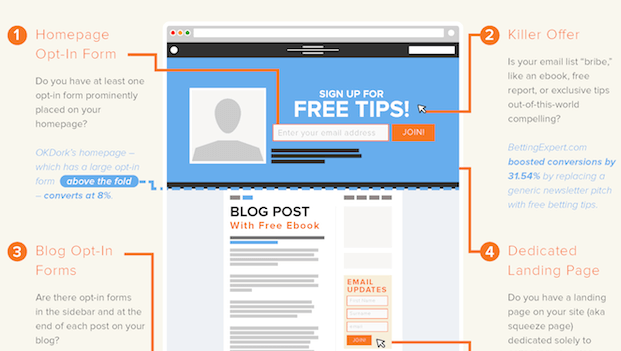
‘Google Authorship’
You’ve probably heard it being bandied around and if you haven’t taken the time to look into it, now’s your chance. Google Authorship will arguably prove to be the most significant tool for building rankings that Google has ever introduced; and if you’re smart about it, you can start benefiting immediately. This post will explain what it is, its implications and how to use it, so it’s a great place to start. Before we begin, it’s important to say that Authorship and AuthorRank are separate, but inescapably linked. Just like nobody ever talked about Tom without mentioning Jerry, it’s hard to talk about Authorship without thinking about AuthorRank.

What is Google Authorship?
Nutshell time!
Google Authorship is Google’s strategy of linking web authors to their online content. So anything you write online can be linked to your online profile (no prizes for guessing it’s your Google+ profile). Google haven’t officially said that this will lead to a writing-quality based ranking system; but they’ve implied it pretty heavily. In 2007, Google patented something called ‘Agent Rank’. You can take a look at the patent here , but if you’re not versed in patent law, Bill Slawski gives a pretty good run down over in February 2007.
Obviously we’re now spoiled by blogs explaining where they were going with this patent, but with the advent of Google+ and Authorship the theories are starting to become an impending reality.
Be Careful
It’s important to remember that Google Authorship and AuthorRank are separate entities.
You can read all about Authorship at the horse’s mouth; but broadly, it’s the link between authors and their content. AuthorRank is the rating system associated with this link. Authorship is in operation now. AuthorRank isn’t.
In a lot of press stuff the G-team has been saying the main focus of Authorship is to link authors to their content. Google Software Engineer, Othar Hansson appears to be obsessed with the fact that it puts your picture next to your post on SERPs and the psychological benefits of this in terms of connectivity. In his words, it’s Google’s way of ‘making the internet more human’. It’s a lovely sentiment, but cynical-old-me still thinks this is all part of the much bigger AuthorRank picture. And that’s not a bad thing. AuthorRank will be a great way of promoting online content based on the merit of its production and weeding out spammers. It punishes anonymity, but celebrates connectivity, and that’s surely a step in the right direction.
AuthorRank isn’t officially in use yet, but the buzz around it has become almost deafening and smart money is on it being run as an operational algorithm very soon.
But, back to Authorship…
Why should Authorship bother me?
Why shouldn’t it? This is the first chance we’ve been given to associate all of our online work in one centralised beacon. If, like me, you originally avoided the Google+ hype, change your mind now, or you might just get left behind.
There’s never been a better reason to join up. It will ensure you get the praise you deserve for the stuff you’ve written in your field of expertise by linking to similar articles you’ve written. In fact, that plan is already in action. Matt McGee has found that as soon as you’re finished reading an article by an author signed up to Authorship, you press ‘back’ on your browser and Hey, Presto! You’re presented with more articles on the same subject from the same author. This is the perfect type of promotion and will benefit your traffic in no time.
Pros and Cons of Authorship (and, inevitably, AuthorRank)
Let’s take a look at the effects Authorship could have on your business:
Pros
– Association with good writers and good content is bound to have a positive influence on your site’s PageRank. AuthorRank will undoubtedly go hand-in-hand with PageRank!
– People will be able to interactively see the merits of your site by clicking the author links on each post.
– Verified quality writers will encourage more people to link to your site. It’ll work wonders for Domain Authority.
– What if that writer who’s earned you all those Click-Throughs leaves? Well, they’ll always be tied to the domain that published their content. So even if they stop writing for you, as long as you both stay on top of your game, you’ll both benefit.
– You’ll get more Clicks because people will trust that smiling Rich Snippet of yours more than they trust a farmed-in link.
– People will be more willing to contact you with their thoughts. That means you’ll be able to engage more with your audience.
– Spammers will be much more easily identified. No Authorship will mean no verified author. Quality content will be rewarded.
Cons
– If you rely on one writer for a high ranking/readership and they leave, you’ll have to work extra hard to keep on top and stay fresh. But there’s nothing new there!
– Authorship can’t be attributed to your company, only to your writers.
– Authorship can’t be attributed to a team, only to ONE writer.
– It acknowledges the achievements of individual writers rather than a whole business.
(But the kudos is shared by association, so everyone’s a winner.)
One point which is a mix of a Pro and a Con: a lot of people have been reporting that their Rich Snippets have taken weeks or even months to show up. Generally, Google seems to giving it on a priority basis to people they think have earned it. That is, people who are getting a lot of traffic for a lot of posts. It seems a little harsh to begin with, but at least this way you know Authorship has truly been earned.
At face value, the pros seem to outweigh the cons; and the cons concerning companies benefiting from the writing of their employees seem to be part of an on-going morality battle. Is it OK for an employer to take credit for their employees work? That’s a question for another time on another blog. But in any case it would seem that Authorship unequivocally promotes and celebrates individualism and, to bang the Marxist drum, denies the power of anonymous corporatism.
How Can I Get On Board?
2 Things you’ll need for Authorship before you start out:
– Online Content (you already have that though, right?)
– A Google+ Profile!
I don’t have Google+!
Let’s start from the start. I’ll show you how to set up a Google+ profile from Scratch; using the perfect blank slate: me!
Step 1: We’ll pretend like none of us has a Google account and start from the front door. Head over to Google+
Step 2: Fill in the Details form
Step 3: After a verification process, you’ll be presented with this box:
Step 4: Get your photo up! This will be the photo used in your Author Rich Snippet.
Step 5: … and Get Involved!
There are plenty of posts around the web that can give you a complete overview of what Google+ has to offer, but since this post is about Google Authorship I’ll leave you with one piece of advice:
Use Google+ as much as possible. The more you engage with your profile and the circles you build, the more you’ll gain from the service and the more strength you’ll have around the web.
So how do I link between my profile and my posts?
Well, there’s a lot of ways this can be done. The process can be quite confusing, but Rick DeJarnette gives a decent overview.
NB. It’s still a little jargony in places.
I’ll break it down as best I can in a second, but if the HTML stuff gets too much, feel free to watch this video of Matt Cutts and Bond-Villain-in-Waiting, Othar Hansson looking uncomfortable and explaining the HTML coding in very accessible terms.
For Sites with One Author:
If you have an email address on the same domain as your published work:
Step 1: Head over to the Authorship sign-up page and fill in the form.
Step 2: Click ‘Verify’ in the Verification Email.
Step 3: In the ‘Edit Profile’ section of your Google+ profile, you’ll now find you’re a ‘Contributor to’ the domain of the email.
Step 4: Start writing as much as possible at that domain. The more Google sees people are looking at your content, the more important Google thinks you are and the sooner you get your picture on the Search Page.
If you don’t have an email address on the same domain as your published work:
This may also be useful for posts in blogs where you’re a guest poster.
The best way in this case is to include a hyperlink with an HTML “rel=author” tag at the bottom of each page you write.
Basically, rel=”Author” is a way of telling Google that the author of this page is at the other end of this link.
The complete HTML link will look something like this:
<a href=”https://plus.google.com/101369752982717498462#101369752982717498462?rel=author”>Joe Shervell</a>
And behave something like this:
Now go back to ‘Edit Profile’ on your Google+ page and edit the ‘Contributor to’ section to include the site you posted to. It may be more beneficial to give the exact URL of the page, like this:
But reportedly listing the domain’s homepage will still work fine.
My site has multiple authors.
That’s ok, so does ours!
Step 1: Make sure you have a Bio Page set up for each writer. Something like this.
Step 2: Set up a Hyperlink from the Content Page to the Bio Page, but make sure you include our old friend, the rel=”author” tag.
Step 3: Set up a Hyperlink from the Bio Page to your Google+ profile, but this time include a rel=”me” tag. Simply put, Google will read this as you saying ‘this is me’.
Step 4: Head back to “Edit Profile” on your Google+ profile and enter the URL of the bio page in the “Contributor to” section.
That’s about the size of it!
But I use WordPress. What about me?
If you’re WordPress savvy then it’s really straight forward:
Step 1: Grab yourself a copy of a plugin like this one.
Step 2: Install it (It’s all explained in better detail right here)
Step 3: Fill in the information on your WordPress User Area.
Step 4: Keep posting and sharing and Google will notice you and give you your well-earned Rich Snippet.
So I’ve Set Up Authorship. Now What?
By setting up Authorship you’ve put yourself on Google’s radar as a writer, and that’s a huge step in the right direction. When AuthorRank does arrive, (and it’s not a matter of if, but when?) the more prestige you’ve earned as a writer, the better.
Use your Google+ profile to interact with your community of readers. Write about what you know, and write about it well. Google will see you as someone worthwhile in the field and give you a better rating in the rankings battle. This ‘writing about what you know’ is an important point. If you’re Noam Chomsky, then Google will recognise all the stuff you’ve written on Language Acquisition and if you decide to blog about it, you’ll be rewarded with high rankings based on your previous work. If you’re Noam Chomsky and you decide to write a blog post about Animal Husbandry in the Serengeti; you might not get the same level of respect.
That seems like an important point; one that I’m loathe to gloss over. Google Authorship can reward expertise. If you build a following and recognition as a writer in a certain field, then it will be reasonably safe for Google to assume that anything you write on that subject will be of a similar calibre. That’s not to discourage you from branching out into other fields; but if you do, make sure you have a community willing to accept that change or you might be punished by negative response.
To sum up neatly; Authorship is essential to let Google know you are a legitimate and quality writer who isn’t out to scam or spam. In the future, AuthorRank will come into the equation, and when it does, make sure you’re ready by building a big following and professional group now on Google+.
And even if we’re all wrong about AuthorRank… what’s the harm in having Google’s Seal-of-Approval on your work?










